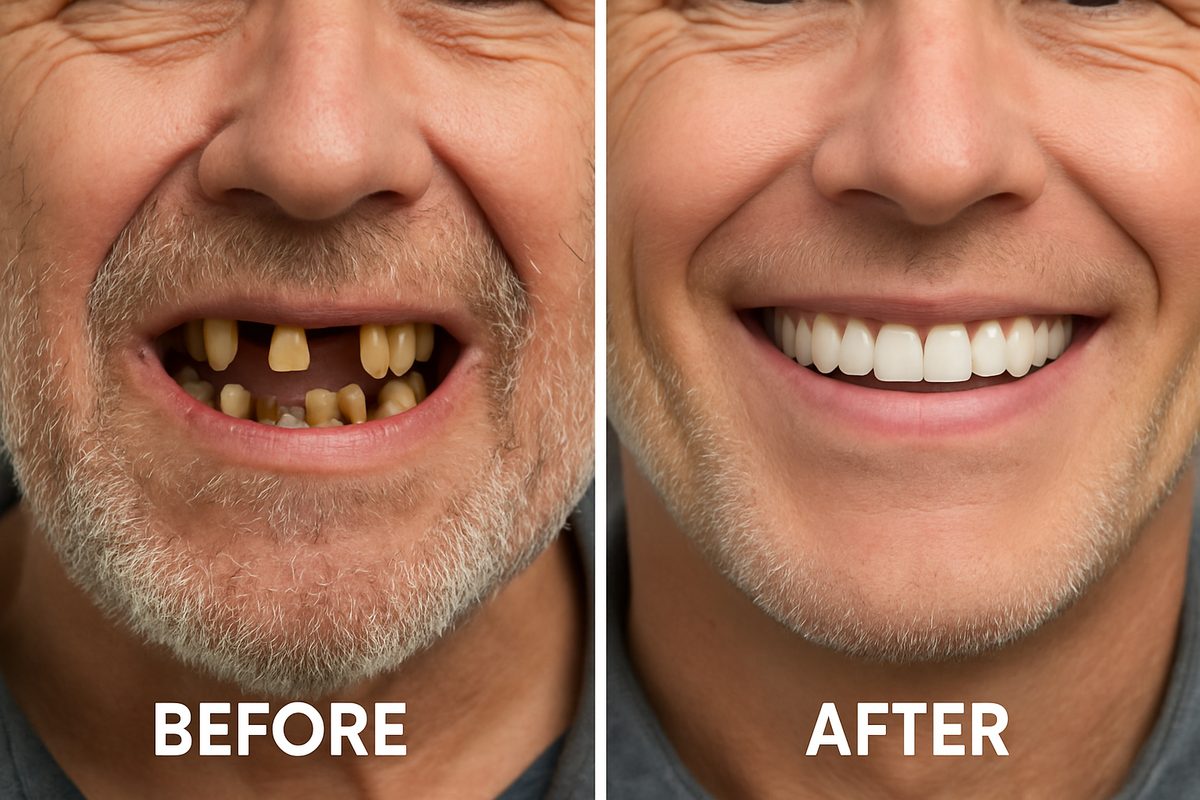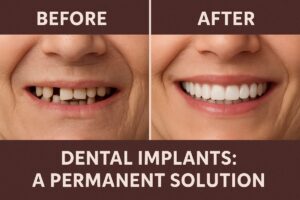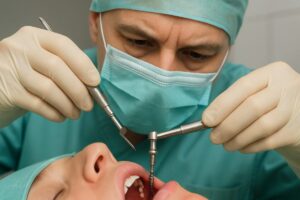This short guide explains what false teeth implants are and helps you decide if they may be right for you. Read on for simple answers about who qualifies, the steps involved, risks, costs, and next steps for false teeth implants.
What are false teeth implants?
False teeth implants are artificial tooth roots (usually titanium) placed into the jaw to hold replacement teeth. Unlike removable dentures, implants anchor crowns, bridges, or full-arch prosthetics so false teeth stay stable when you eat and speak.
Implants can support a single tooth or a full set of false teeth implants in Fort Wayne, IN, giving a more natural feel and better chewing than many denture options.
Who is a good candidate for false teeth implants?
Overall health and medical conditions
Good candidates are generally healthy enough for minor oral surgery. Chronic conditions like uncontrolled diabetes, certain immune disorders, or treatments that affect healing (chemotherapy, long-term steroids) can raise risk. Always tell your provider about medications and health history.
Jaw bone and oral health
Implants need enough jaw bone and healthy gums. If bone volume is low, you may need a bone graft before getting false teeth implants near Auburn, IN. Active gum disease must be treated first to lower risk of implant problems.
Lifestyle factors
Smoking, poor oral hygiene, and heavy alcohol use increase the chance of failure. You should be willing to commit to daily care and regular checkups. Also consider whether you want a permanent solution—implants require a long-term commitment.
How false teeth implants are placed — step by step
Initial exam and imaging
The dentist will take a medical history, exam your mouth, and order X-rays or a CBCT 3D scan. These images show bone levels and help plan where to place the implants. You’ll discuss options, costs, and sedation choices.
Surgical placement and healing
During surgery the implant is placed into the jaw. Healing time lets the bone fuse to the implant (osseointegration), usually 3–6 months. Some patients get temporary false teeth during this period. Sedation options can make the procedure more comfortable.
Final restoration
After healing, the dentist attaches an abutment and then a crown, bridge, or denture that fits on the implants. The final false teeth are shaped and colored to look natural and restore chewing and speech.
Benefits of false teeth implants
Key benefits include:
- Stable chewing and speaking compared with removable dentures
- Bone preservation in the jaw, which helps facial structure
- A natural look and feel that improves confidence
- Long-term durability when properly cared for
Many patients choose false teeth implants in Fort Wayne, IN for these lasting benefits.
Risks and possible complications
Complications are uncommon but can include infection, failure of the implant to integrate, nerve injury (numbness or tingling), sinus problems with upper-jaw implants, and peri-implantitis (inflammation around the implant). Most issues are treatable if caught early.
Alternatives to false teeth implants
Options include removable dentures, traditional bridges, and implant-retained dentures. Removable dentures cost less up front but can slip and may speed bone loss. Bridges replace a few teeth but need nearby healthy teeth for anchors. Implant-retained dentures use implants for stability but may be less permanent than fixed implant bridges.
Cost, insurance, and financing for false teeth implants
Costs depend on the number of implants, the type of final restoration, imaging, and whether bone grafts or extractions are needed. Dental insurance may cover parts of the treatment (like extractions or the crown) but often not the full implant cost. Ask about payment plans, third-party financing, or in-house options.
Getting estimates for false teeth implants in Fort Wayne, IN and comparing payment plans helps you plan for treatment without surprises.
How to choose the right provider for false teeth implants
Look for training and experience in implant dentistry, before-and-after photos, and patient reviews. Ask about the implant systems used, sedation options, and whether 3D imaging and guided surgery are offered. A clear treatment plan and transparent pricing are important.
When you meet the provider, ask how many implant cases they place each year and what their complication and success rates are. If you want gentle care during surgery, confirm sedation credentials and experience.
For patients near Fort Wayne and Auburn, IN, consider practices that offer advanced imaging and sedation to make the process more comfortable.
Recovery and long-term care
Expect some swelling and soreness for a few days after surgery. Follow your dentist’s instructions for pain control and a soft-food diet during early healing. Brush gently, floss around implants, and keep regular dental cleanings. Annual or biannual implant checkups help catch problems early.
Quick checklist: Are false teeth implants right for you?
- Do you have reasonable overall health for minor surgery? — Yes / No
- Do you have enough jaw bone or are you willing to consider grafting? — Yes / No
- Can you commit to daily oral care and regular visits? — Yes / No
- Is the cost or financing within your budget? — Yes / No
- Are you looking for a long-term fixed solution rather than removable dentures? — Yes / No
Next steps
If you’re considering false teeth implants in Fort Wayne, IN or false teeth implants in Auburn, IN, schedule a consultation to discuss your health, imaging, and a personalized plan. A consult will answer your questions, outline costs, and show you options for sedation during treatment.
Dr. David Painter and the team at Sedation & Implant Dentistry offer implant care and sedation for patients in the Fort Wayne and Auburn area. Ask about credentials, before-and-after photos, and financing when you call to book a visit.






